Rick Gates, a key cooperator in special counsel Robert Mueller's Russia investigation, testified Thursday against a prominent Washington attorney accused of concealing information from the Justice Department about work done for the government of Ukraine.
Gates, a former campaign aide to President Donald Trump who pleaded guilty last year in Mueller's investigation, took the stand as a government witness against Greg Craig. It was the latest installment of Gates' effort to secure leniency from the Justice Department in exchange for his cooperation with multiple probes. Among those is the case against Craig, an offshoot of Mueller's investigation into potential ties between the Trump campaign and Russia and part of an ongoing Justice Department crackdown on unregistered lobbying in the U.S. on behalf of foreign governments and other entities.
Gates spent hours describing the international political consulting work he and business associate Paul Manafort — a co-defendant in the Mueller investigation who's been sentenced to more than seven years in prison — did for a pro-Russia Ukrainian political party and how Craig came to be involved in some of those efforts.

Greg Craig, former White House counsel to former President Barack Obama, walks into a federal courthouse for his trial, Thursday, Aug. 22, 2019, in Washington. (AP PhotoPatrick Semansky)
The work that drew the Justice Department's attention occurred in 2012, when Craig and his law firm at the time — Skadden, Arps, Slate, Meagher and Flom — were hired by the government of Ukraine to write a report on the prosecution of Yulia Tymoshenko, a former Ukrainian prime minister. Tymoshenko was a political opponent of then-Ukrainian President Viktor Yanukovych, a longtime Manafort patron and a political figure whom Gates said he and Manafort had helped get elected.
The report was billed as independent, but critics have said it whitewashed a politically motivated prosecution, and Gates acknowledged on the witness stand that the document was conceived as a way to counter international criticism that Tymoshenko had been denied a fair trial.
Gates said Manafort arranged for the hiring of Skadden to prepare the report, and said he served as an intermediary for the firm and worked with Craig on a publicity plan for the document. That included giving an embargoed copy to New York Times reporter David Sanger. Though the article was not entirely favorable, Gates said he considered the strategy a success given the credibility he believed was associated with the publication and the reporter.
"From our standpoint, the success of it was very great," Gates said.
When a prosecutor asked whether Craig had carried out the role he had committed to with regard to The Times, Gates answered, "Yes, he did."
Craig, who has called the prosecution unprecedented and unjustified, decided that he did not need to register his work with a Justice Department unit tasked with enforcing the Foreign Agents Registration Act. The law, enacted in 1938 to unmask Nazi propaganda in the United States, requires people to disclose to the Justice Department when they advocate, lobby or perform public relations work in the U.S. on behalf of a foreign government or political entity.
Though prosecutors have not charged Craig with failing to register, they said he gave the Justice Department misleading information about the work when the FARA unit informed him and his firm that they thought he might need to disclose his work.
Craig was charged in April in a two-count indictment, but the judge overseeing the case dismissed one of the charges before trial. Craig's lawyers deny that he lied to the government or his law firm. They acknowledged that Craig spoke to reporters about the report but denied it was part of a public relations campaign that would run afoul of the law.
During cross-examination, a lawyer for Craig, Paula Junghans, sought to distance Craig from Gates and tried to cast doubt on the idea that her client was doing the bidding of the Ukraine government. She showed excerpts from the report that raised important questions about the fairness of the Tymoshenko trial, including a statement that said, "Under Western standards, we find that the decision to detain Tymoshenko for the entire balance of her trial and after the trial had concluded — until sentencing — without adequate justification or review raises concerns about whether she was inappropriately deprived of her liberty prior to her conviction."
Junghans also sought to undermine Gates' credibility by noting the wide-ranging tax and financial fraud conspiracy he admitted to last year, and the fact that prosecutors have agreed not to charge him with certain conduct in exchange for his cooperation.
When it comes to crimes, Junghans said, "You've committed quite a few, haven't you?"
"Yes," Gates replied.
Follow Eric Tucker on Twitter at http://www.twitter.com/etuckerAP
VENICE, Italy (AP) — Under the gaze of the world’s media, the fragile lagoon city of Venice launches a pilot program Thursday to charge day-trippers a 5-euro (around $5.35) entry fee that authorities hope will discourage visitors from arriving on peak days and make the city more livable for its dwindling residents.
Signs advising arriving visitors of the new requirement for a test phase of 29 days through July have been erected outside the main train station and other points of arrival.
Some 200 stewards have been trained to politely walk anyone unaware of the fee through the process of downloading a QR code. A kiosk has been set up for those not equipped with a smartphone. Once past designated entry ports, officials will carry out random checks for QR codes that show the day-tripper tax has been paid or that the bearer is exempt.
Transgressors face fines 50 euros to 300 euros. The requirement applies only for people arriving between 8:30 a.m. and 4 p.m. Outside of those hours, access is free.
“We need to find a new balance between the tourists and residents,’’ said the city’s top tourism official, Simone Venturini. “We need to safeguard the spaces of the residents, of course, and we need to discourage the arrival of day-trippers on some particular days.”
Venice has long suffered under the pressure of over-tourism, but officials say that pre-pandemic estimates ranging from 25 million to 30 million visitors a year — including day-trippers — are not reliable and that the pilot project also aims to come up with more exact figures to help better manage the phenomenon.
By contrast, registered visitors spending the night last year numbered 4.6 million, according to city figures, down 16% from pre-pandemic highs.
Venturini said the city is strained when the number of day-trippers reaches 30,000 to 40,000. Its narrow alleyways are clogged with people and water taxis packed, making it difficult for residents to go about their business.
Not all residents, however, are persuaded of the efficacy of the new system in dissuading mass tourism, and say more attention needs to be paid to boosting the resident population and services they need.
Venice last year passed a telling milestone when the number of tourist beds exceeded for the first time the number of official residents, which is now below 50,000 in the historic center with its picturesque canals.
“Putting a ticket to enter a city will not decrease not even by one single unit the number of visitors that are coming,’’ said Tommaso Cacciari, an activist who organized a protest Thursday against the measure.
“You pay a ticket to take the metro, to go to a museum, an amusement park; you don’t pay a ticket to enter a city. This is the last symbolic step of a project of an idea of this municipal administration to kick residents out of Venice,” he said.
Venturini said about 6,000 people had already paid to download the QR code, and officials expect paid day-tripper arrivals Thursday to reach some 10,000.
More than 70,000 others have downloaded a QR code denoting an exemption, including to work in Venice or as a resident of the Veneto region. People staying in hotels in Venice, including in mainland districts like Marghera or Mestre, should also get a QR code attesting to their stay, which includes a hotel tax.
The tourist official says interest in Venice's pilot program has been keen from other places suffering from mass tourism, including other Italian art cities and cities abroad such as Barcelona and Amsterdam.
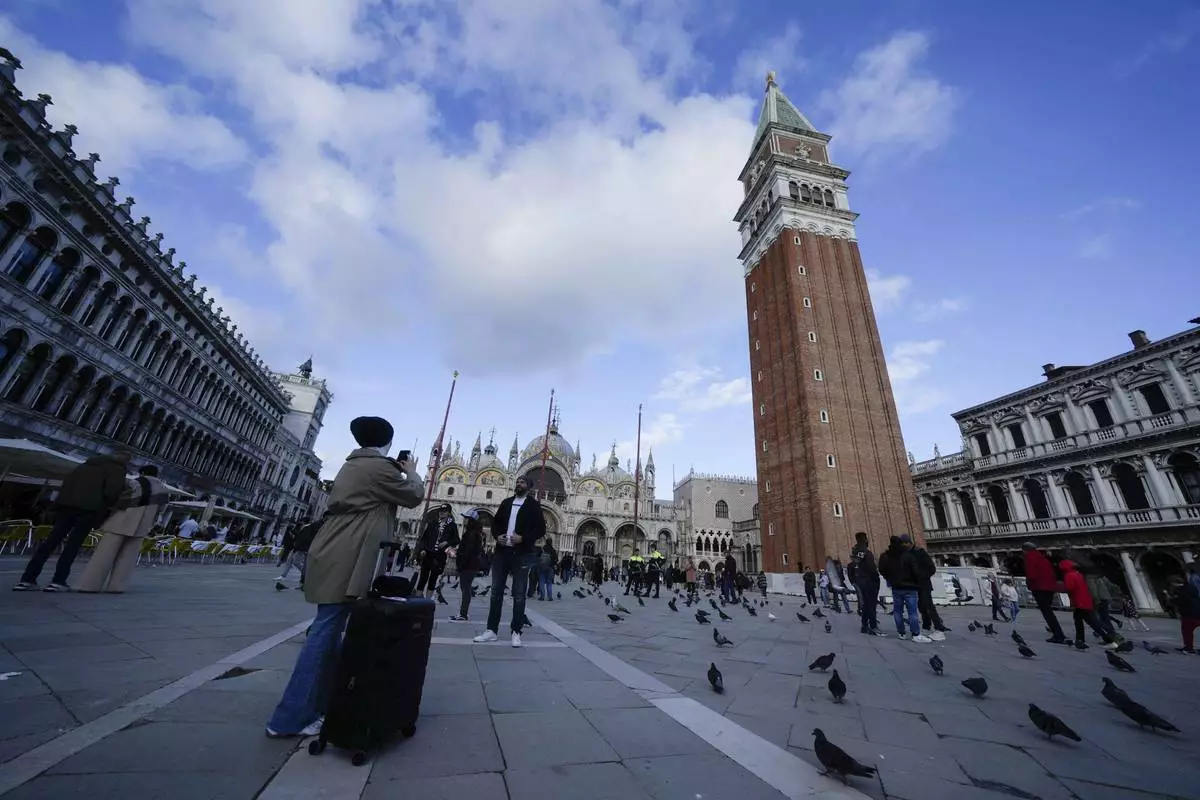
Tourists take pictures at the St. Mark square in Venice, Italy, Wednesday, April 24, 2024. The lagoon city of Venice begins a pilot program Thursday, April 25, 2024 to charge daytrippers a 5 euro entry fee that authorities hope will discourage tourists from arriving on peak days. Officials expect some 10,000 people will pay the fee to access the city on the first day, downloading a QR code to prove their payment. (AP Photo/Luca Bruno)
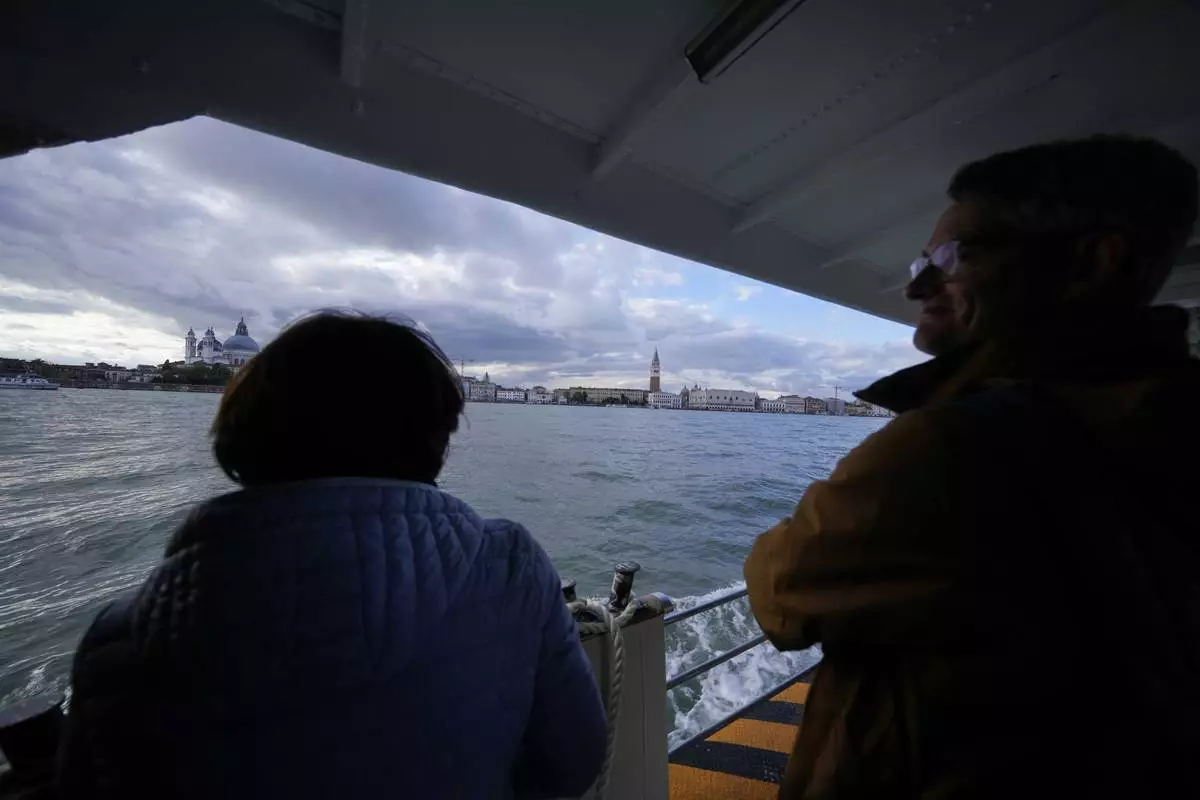
Tourists ride on a ferry boat in Venice, Italy, Wednesday, April 24, 2024. The lagoon city of Venice begins a pilot program Thursday, April 25, 2024 to charge daytrippers a 5 euro entry fee that authorities hope will discourage tourists from arriving on peak days. Officials expect some 10,000 people will pay the fee to access the city on the first day, downloading a QR code to prove their payment. (AP Photo/Luca Bruno)
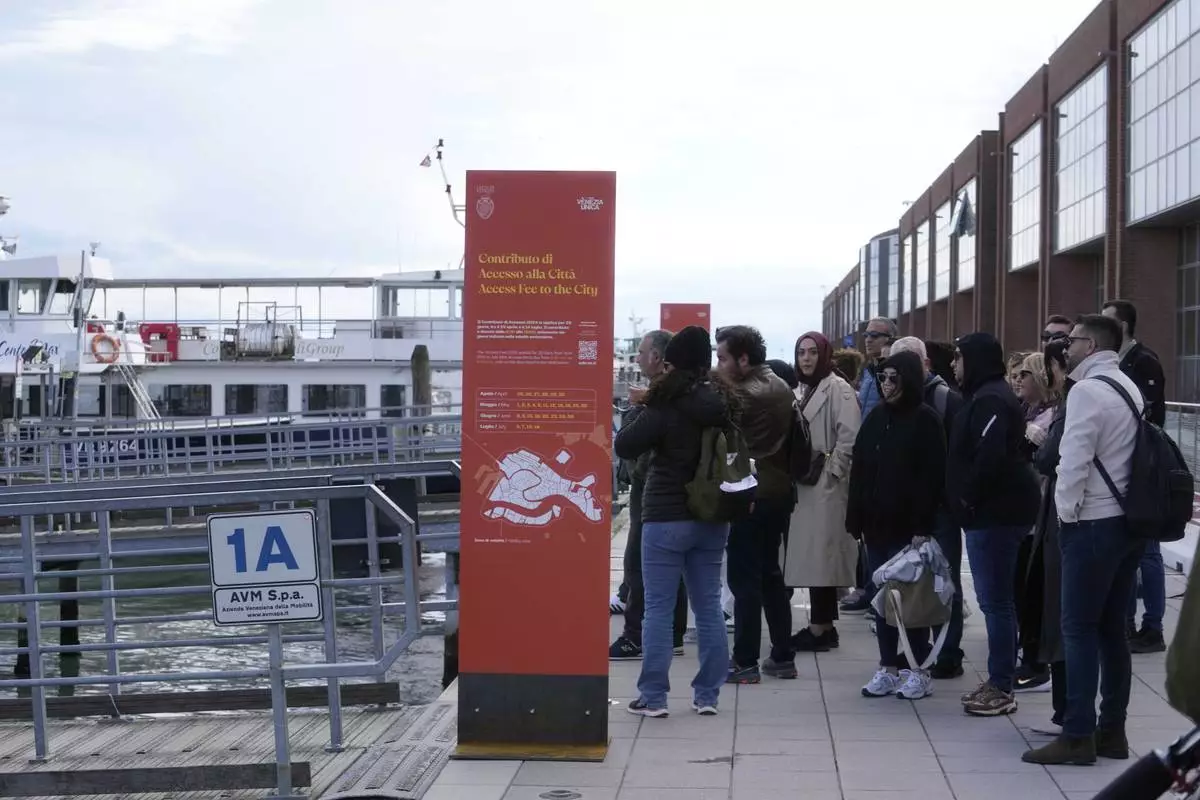
People stand in front of an information board explaining how to pay the tourist tax in Venice, Italy, Wednesday, April 24, 2024. The lagoon city of Venice begins a pilot program Thursday, April 25, 2024 to charge daytrippers a 5 euro entry fee that authorities hope will discourage tourists from arriving on peak days. Officials expect some 10,000 people will pay the fee to access the city on the first day, downloading a QR code to prove their payment. (AP Photo/Luca Bruno)
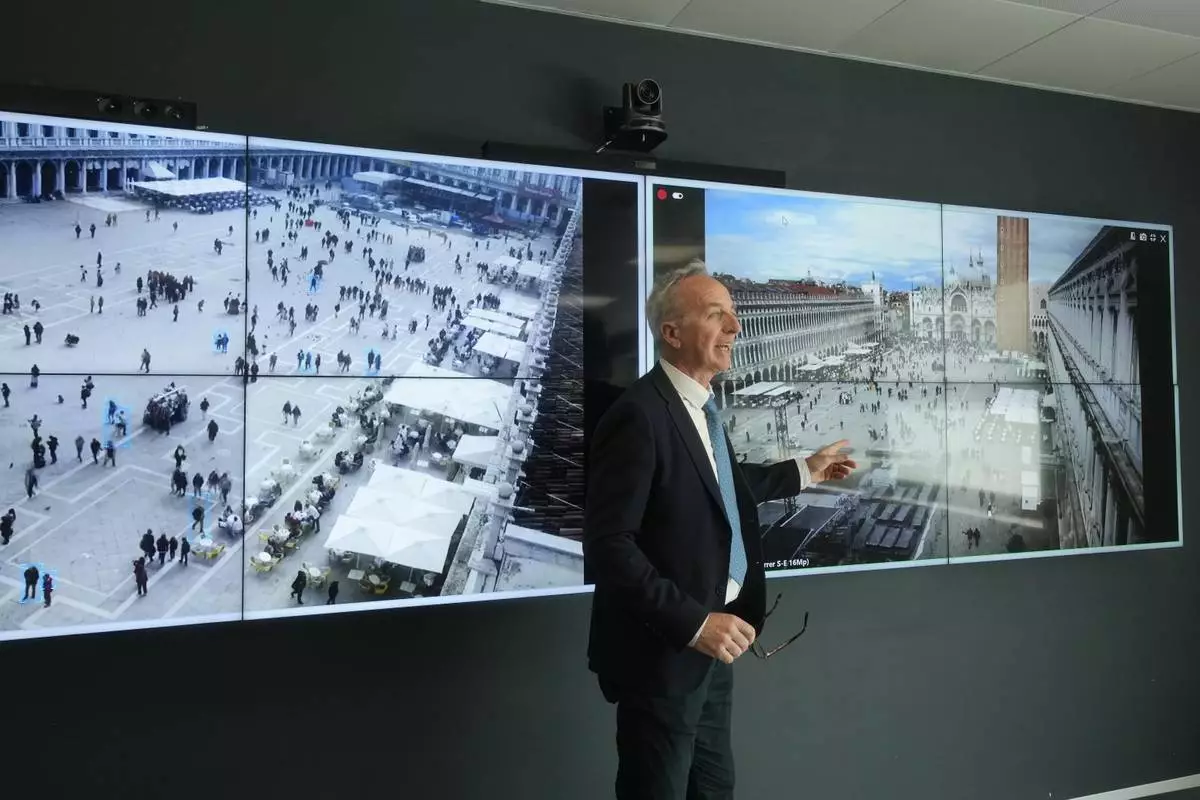
Marco Bettini, director of Venis Informatics System, gestures as he talks to reporters at the police Venice control room, in Venice, Italy, Wednesday, April 24, 2024. The lagoon city of Venice begins a pilot program Thursday, April 25, 2024 to charge daytrippers a 5 euro entry fee that authorities hope will discourage tourists from arriving on peak days. Officials expect some 10,000 people will pay the fee to access the city on the first day, downloading a QR code to prove their payment. (AP Photo/Luca Bruno)
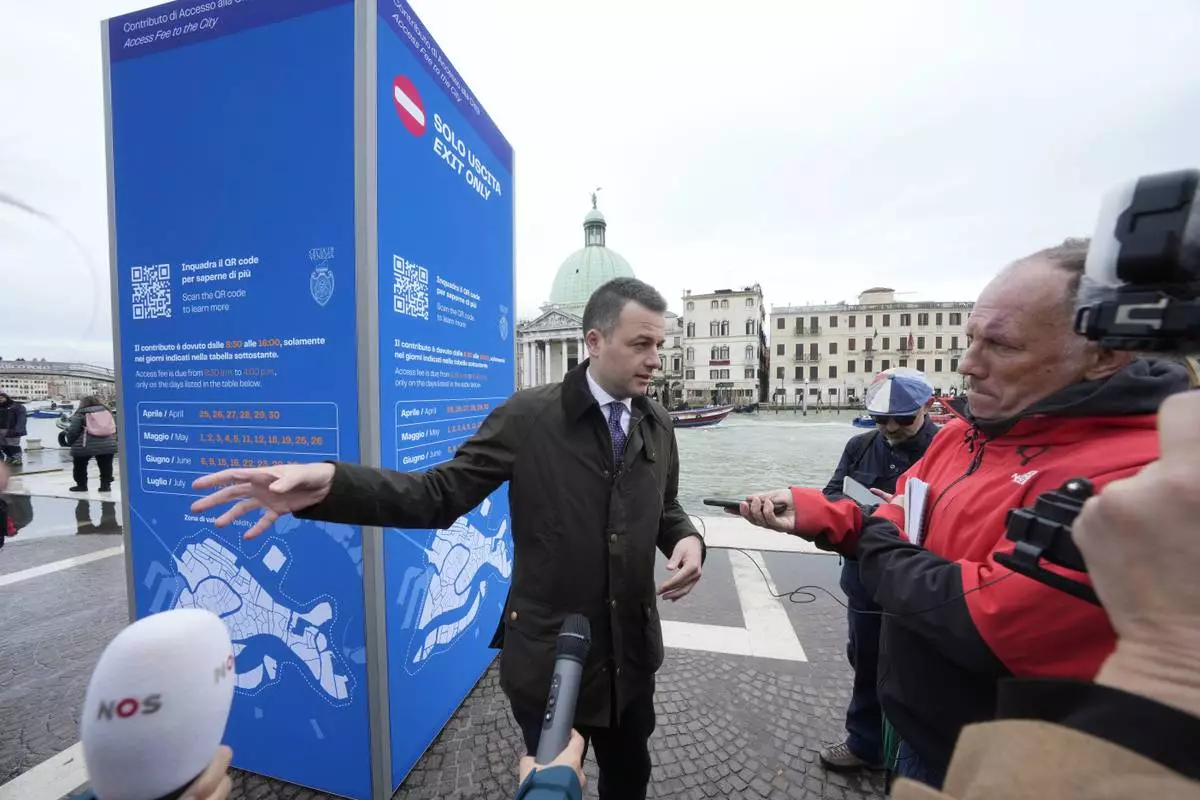
Venice councillor Simone Venturini speaks with reporters in front of a tourist tax totem in Venice, Italy, Wednesday, April 24, 2024. The lagoon city of Venice begins a pilot program Thursday, April 25, 2024 to charge daytrippers a 5 euro entry fee that authorities hope will discourage tourists from arriving on peak days. Officials expect some 10,000 people will pay the fee to access the city on the first day, downloading a QR code to prove their payment. (AP Photo/Luca Bruno)
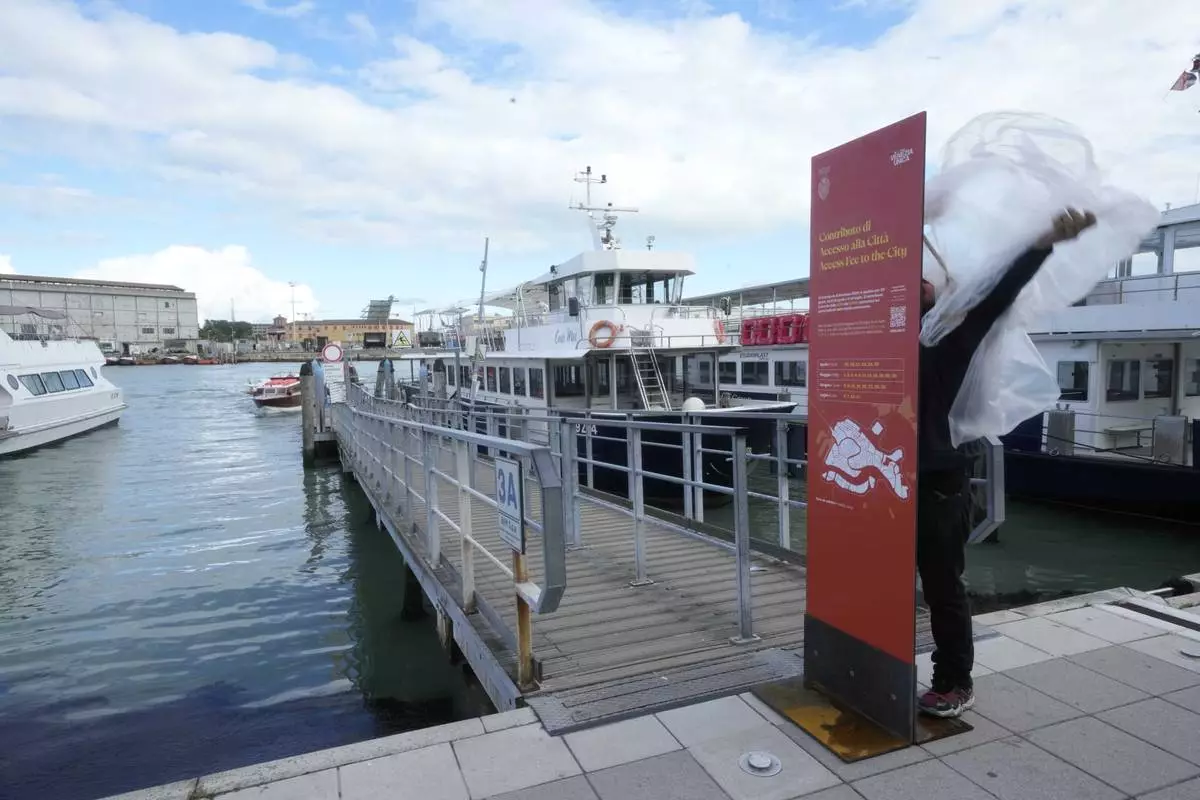
Workers prepare banner explaining how to pay the tourist tax in Venice, Italy, Wednesday, April 24, 2024. The lagoon city of Venice begins a pilot program Thursday, April 25, 2024 to charge daytrippers a 5 euro entry fee that authorities hope will discourage tourists from arriving on peak days. Officials expect some 10,000 people will pay the fee to access the city on the first day, downloading a QR code to prove their payment. (AP Photo/Luca Bruno)
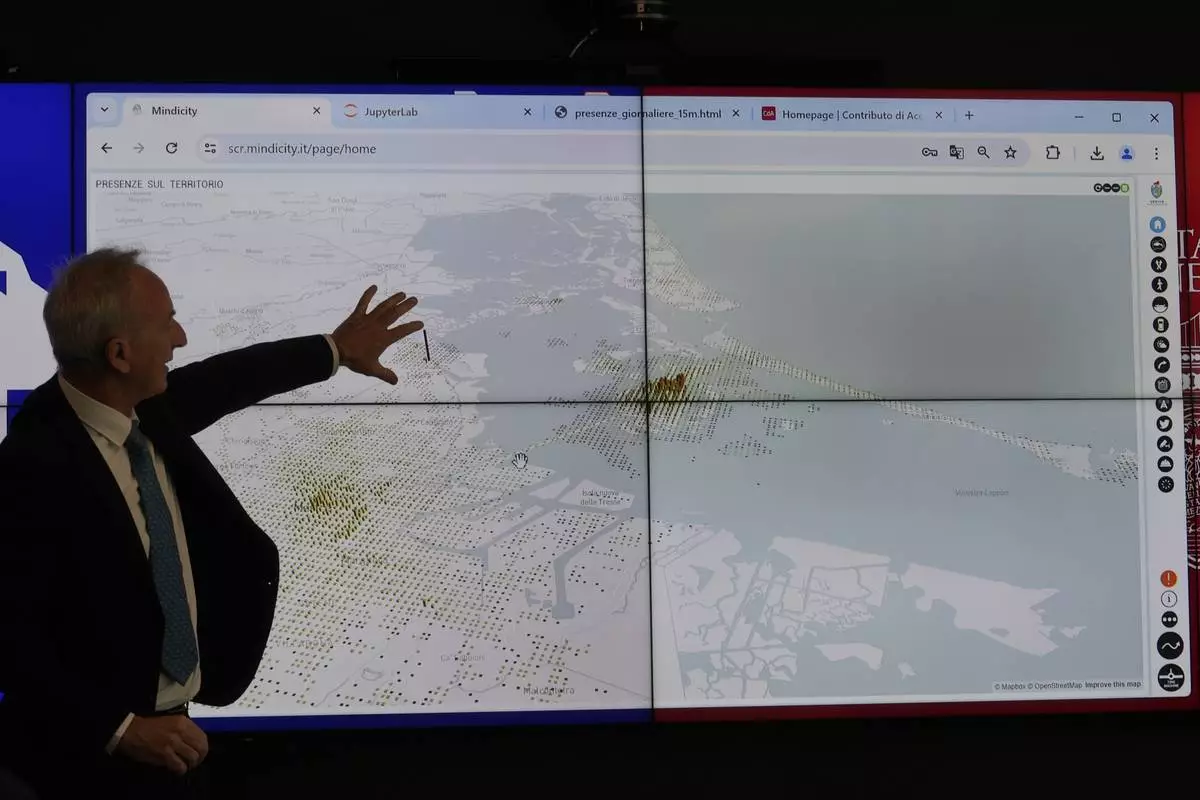
Marco Bettini, director of Venis Informatics System, gestures as he explains the Venice density to reporters at the police Venice control room in Venice, Italy, Wednesday, April 24, 2024. The lagoon city of Venice begins a pilot program Thursday, April 25, 2024 to charge daytrippers a 5 euro entry fee that authorities hope will discourage tourists from arriving on peak days. Officials expect some 10,000 people will pay the fee to access the city on the first day, downloading a QR code to prove their payment. (AP Photo/Luca Bruno)
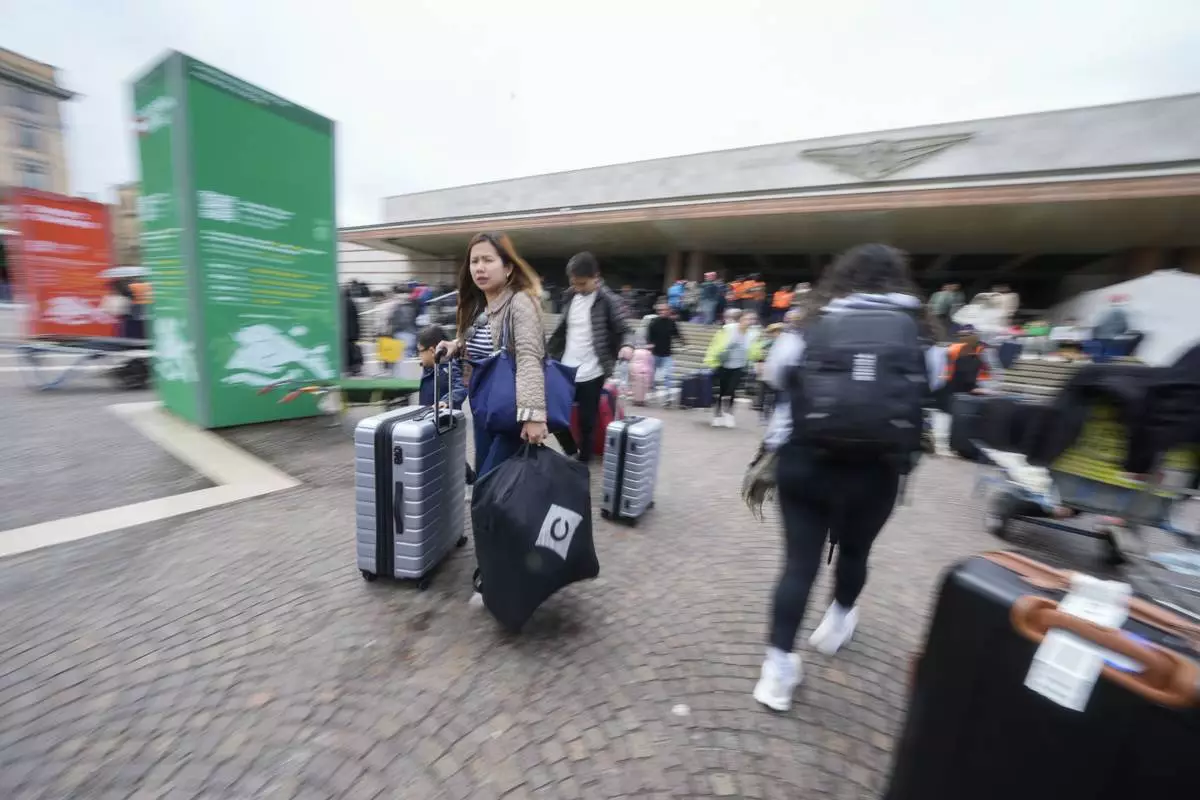
Tourists arrive at the main train station in Venice, Italy, Wednesday, April 24, 2024. The lagoon city of Venice begins a pilot program Thursday, April 25, 2024 to charge daytrippers a 5 euro entry fee that authorities hope will discourage tourists from arriving on peak days. Officials expect some 10,000 people will pay the fee to access the city on the first day, downloading a QR code to prove their payment. (AP Photo/Luca Bruno)
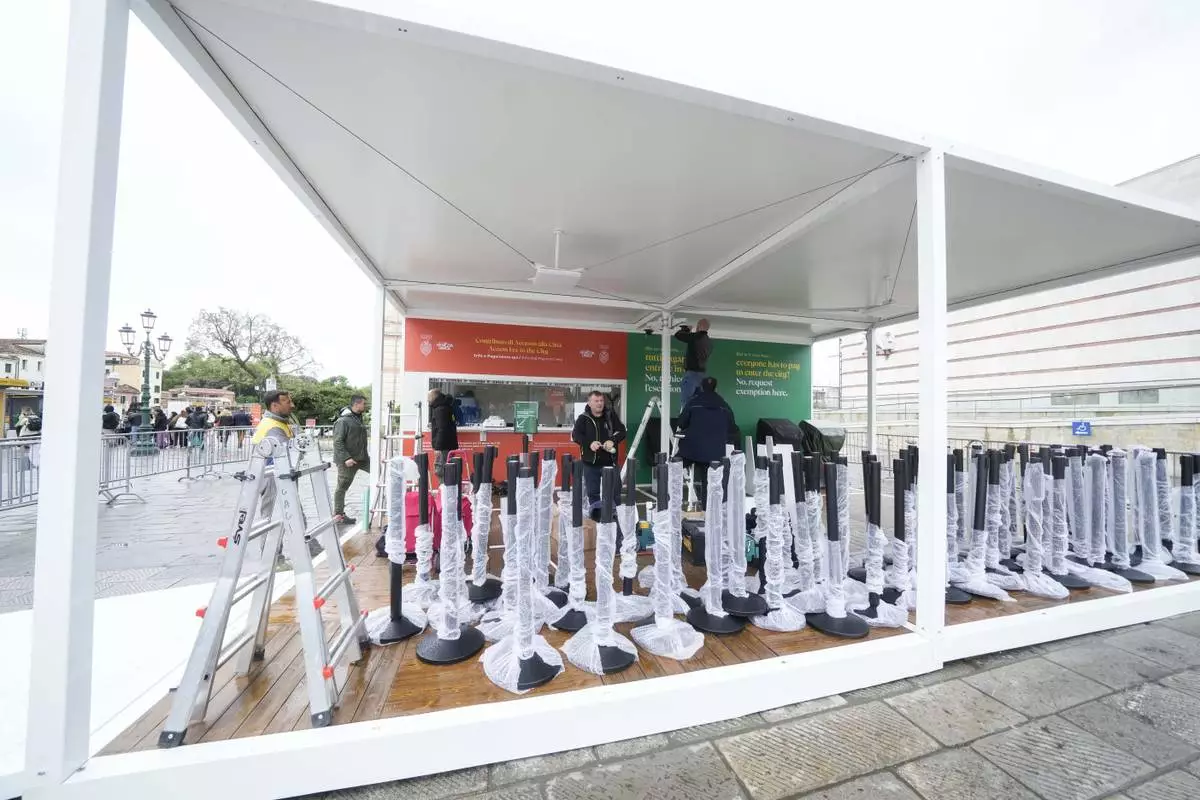
Workers prepare the tourist tax cashier desks outside the main train station in Venice, Italy, Wednesday, April 24, 2024. The lagoon city of Venice begins a pilot program Thursday, April 25, 2024 to charge daytrippers a 5 euro entry fee that authorities hope will discourage tourists from arriving on peak days. Officials expect some 10,000 people will pay the fee to access the city on the first day, downloading a QR code to prove their payment. (AP Photo/Luca Bruno)
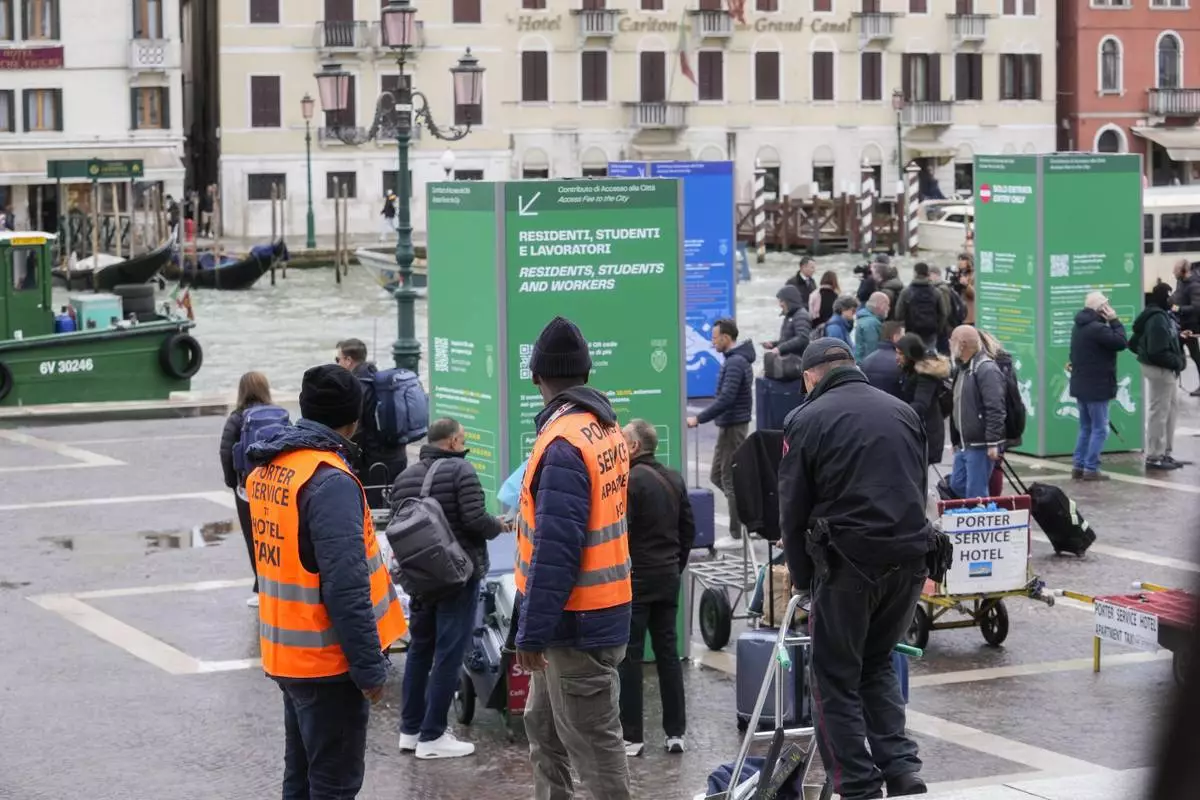
Porters wait for tourists outside the main train station in Venice, Italy, Wednesday, April 24, 2024. The lagoon city of Venice begins a pilot program Thursday, April 25, 2024 to charge daytrippers a 5 euro entry fee that authorities hope will discourage tourists from arriving on peak days. Officials expect some 10,000 people will pay the fee to access the city on the first day, downloading a QR code to prove their payment. (AP Photo/Luca Bruno)
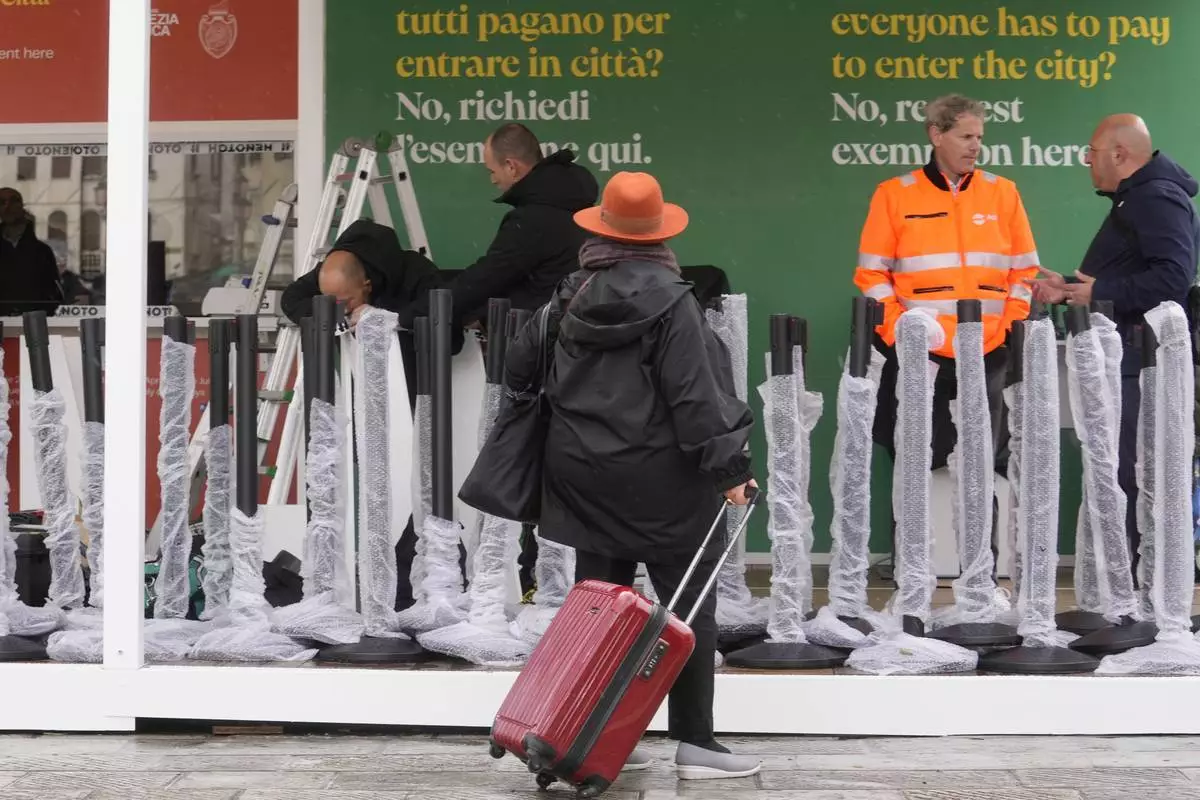
Workers prepare the tourist tax cashier desks outside the main train station in Venice, Italy, Wednesday, April 24, 2024. The lagoon city of Venice begins a pilot program Thursday, April 25, 2024 to charge daytrippers a 5 euro entry fee that authorities hope will discourage tourists from arriving on peak days. Officials expect some 10,000 people will pay the fee to access the city on the first day, downloading a QR code to prove their payment. (AP Photo/Luca Bruno)
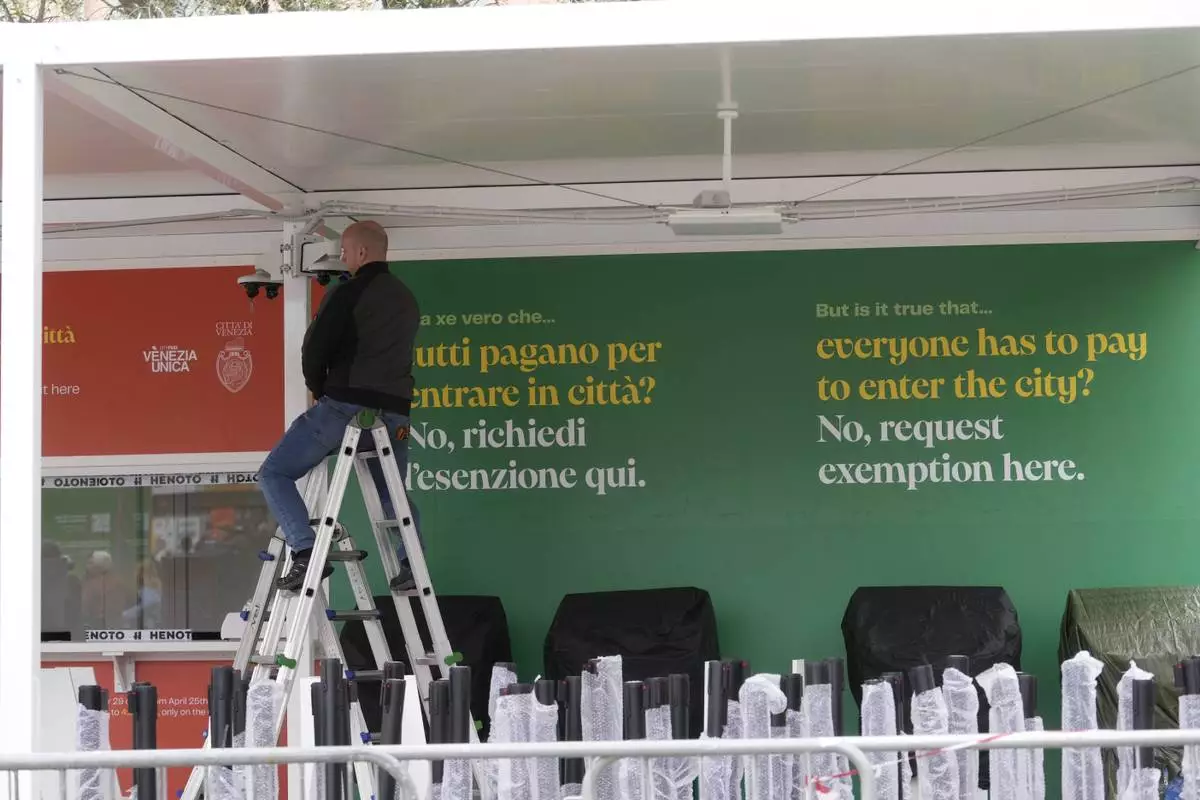
Workers prepare the tourist tax cashier desks outside the main train station in Venice, Italy, Wednesday, April 24, 2024. The lagoon city of Venice begins a pilot program Thursday, April 25, 2024 to charge daytrippers a 5 euro entry fee that authorities hope will discourage tourists from arriving on peak days. Officials expect some 10,000 people will pay the fee to access the city on the first day, downloading a QR code to prove their payment. (AP Photo/Luca Bruno)
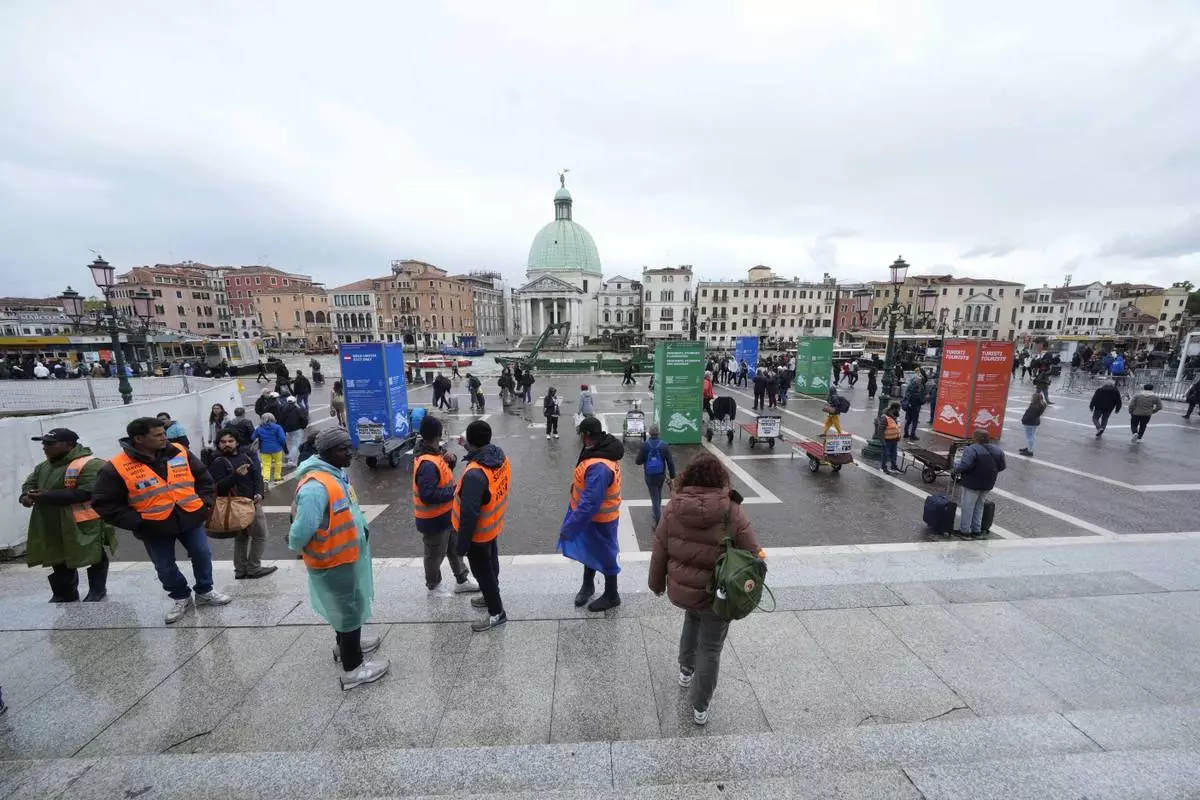
Porters wait for tourists outside the main train station in Venice, Italy, Wednesday, April 24, 2024. The lagoon city of Venice begins a pilot program Thursday, April 25, 2024 to charge daytrippers a 5 euro entry fee that authorities hope will discourage tourists from arriving on peak days. Officials expect some 10,000 people will pay the fee to access the city on the first day, downloading a QR code to prove their payment. (AP Photo/Luca Bruno)
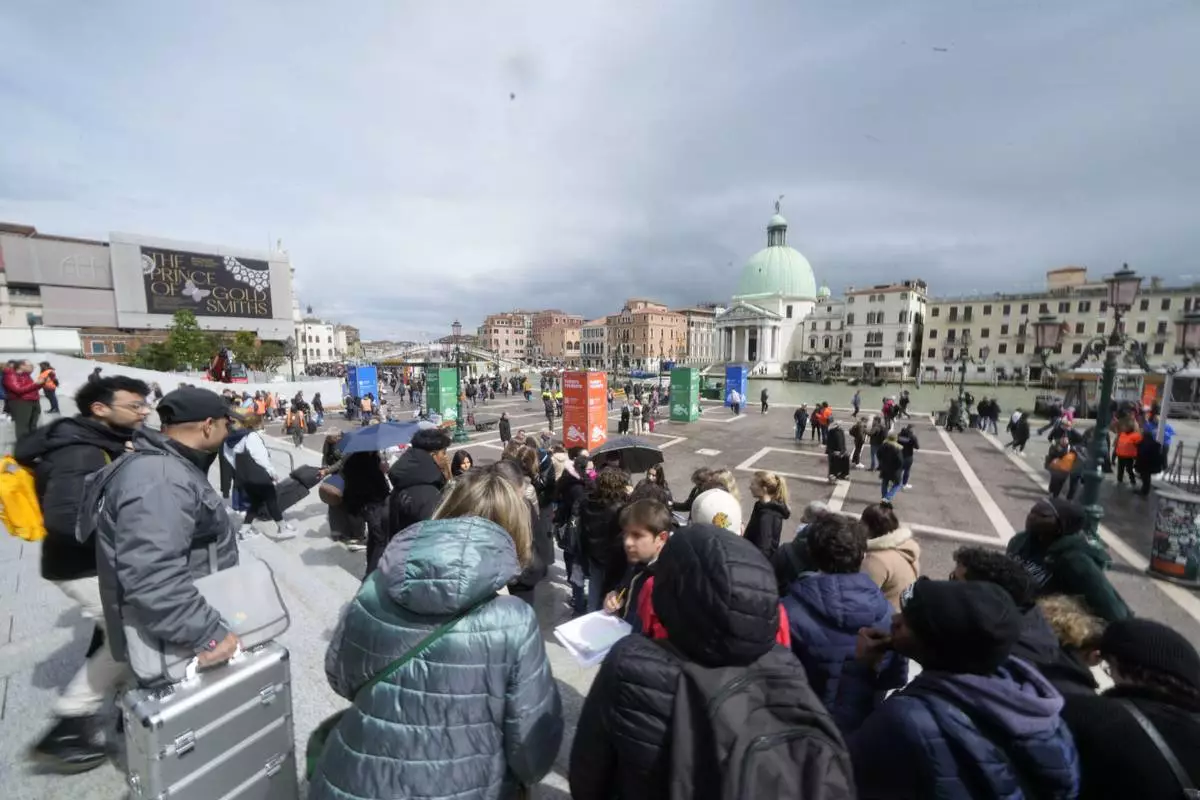
Tourists arrive outside the main train station in Venice, Italy, Wednesday, April 24, 2024. The lagoon city of Venice begins a pilot program Thursday, April 25, 2024 to charge daytrippers a 5 euro entry fee that authorities hope will discourage tourists from arriving on peak days. Officials expect some 10,000 people will pay the fee to access the city on the first day, downloading a QR code to prove their payment. (AP Photo/Luca Bruno)
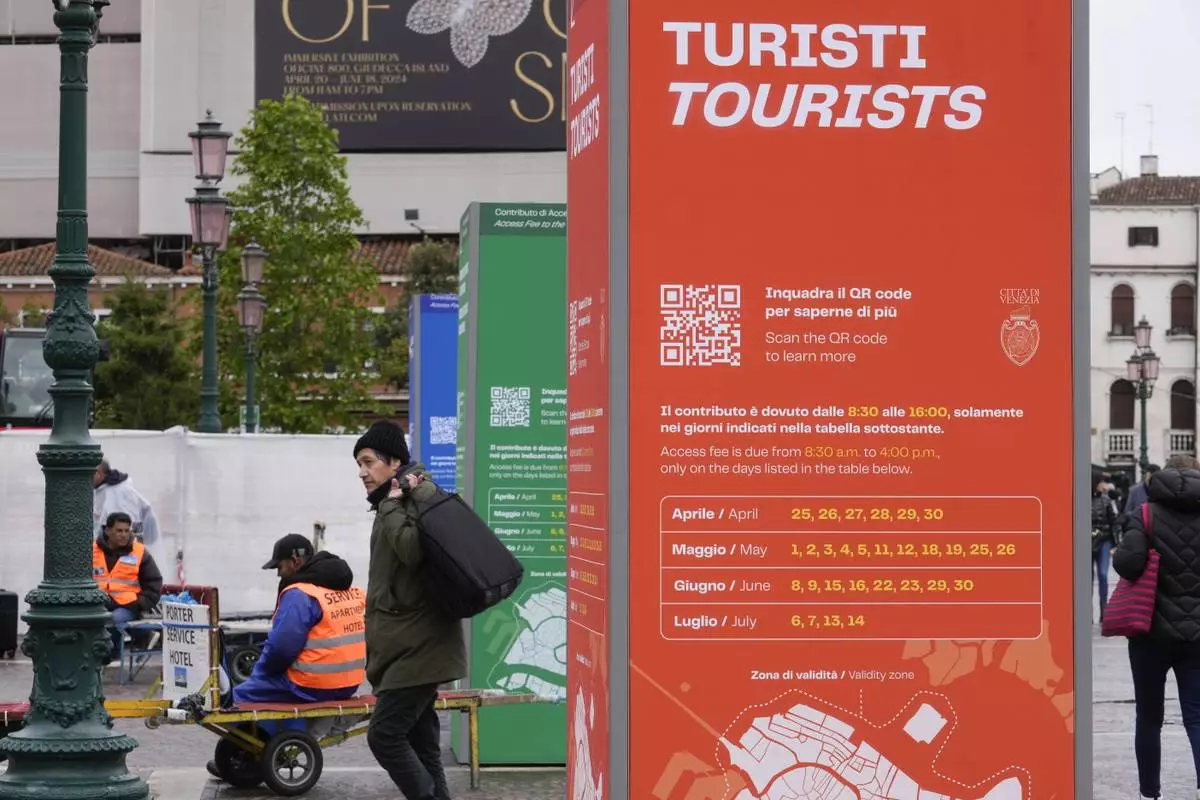
Tourist information boards are seen outside the main train station in Venice, Italy, Wednesday, April 24, 2024. The lagoon city of Venice begins a pilot program Thursday, April 25, 2024 to charge daytrippers a 5 euro entry fee that authorities hope will discourage tourists from arriving on peak days. Officials expect some 10,000 people will pay the fee to access the city on the first day, downloading a QR code to prove their payment. (AP Photo/Luca Bruno)
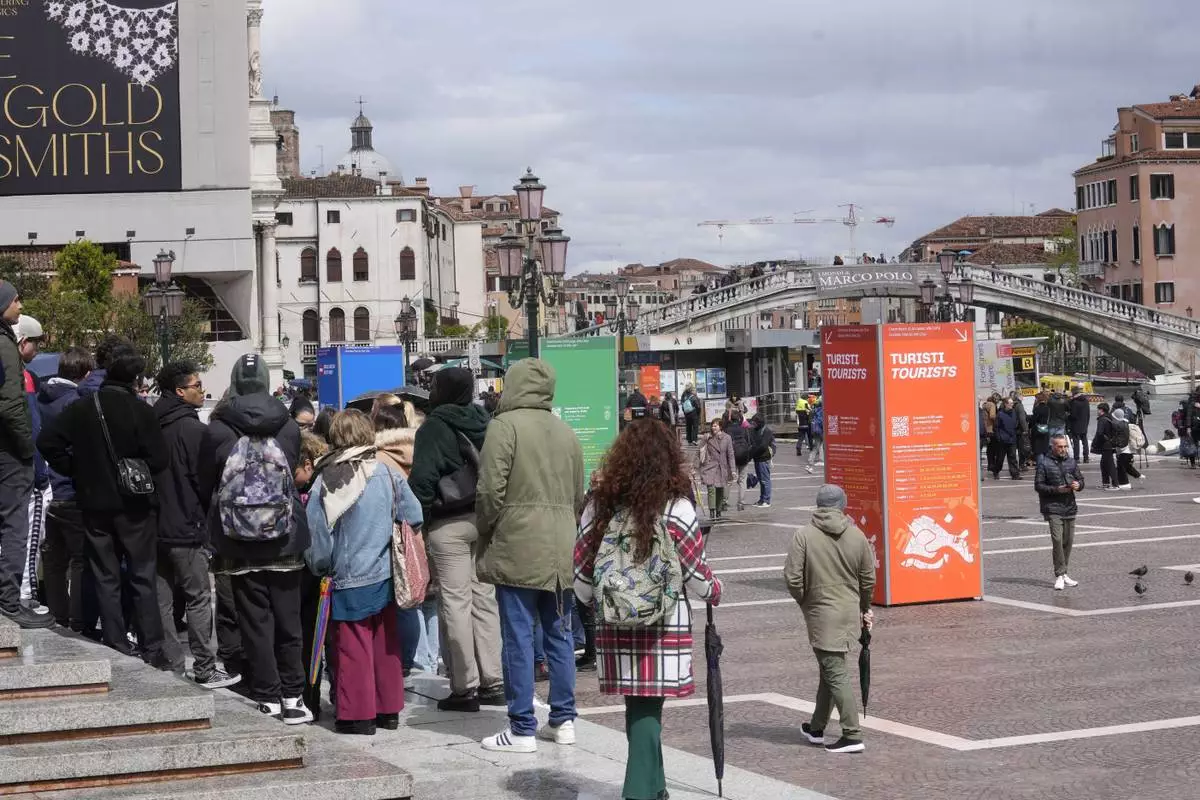
Tourists arrive outside the main train station in Venice, Italy, Wednesday, April 24, 2024. The lagoon city of Venice begins a pilot program Thursday, April 25, 2024 to charge daytrippers a 5 euro entry fee that authorities hope will discourage tourists from arriving on peak days. Officials expect some 10,000 people will pay the fee to access the city on the first day, downloading a QR code to prove their payment. (AP Photo/Luca Bruno)


























